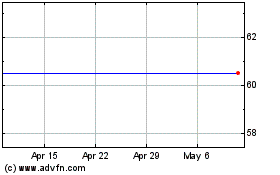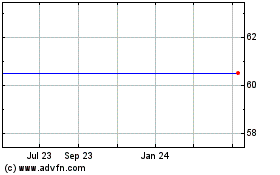Glaxo Profit Jumps on Weaker Pound
October 26 2016 - 10:20AM
Dow Jones News
LONDON—GlaxoSmithKline PLC said profit soared in the third
quarter, in part thanks to a boost from the weakness of the pound
following Britain's vote to leave the European Union.
The U.K.-based drugmaker, which reports in sterling but makes
almost all its sales in other currencies, is benefiting from the
persistent weakness of the pound as politicians start thrashing out
the terms of the country's exit from the EU. The pound has fallen
some 19% against the U.S. dollar and 15% against the euro since the
June 23 referendum.
It said net profit for the three months to Sept. 30 climbed 50%
to £ 808 million ($987 million), from £ 538 million a year earlier.
Core operating profit, a measure that strips out one-time items,
rose 35% to £ 2.3 billion, while revenue jumped 23% to £ 7.5
billion. Excluding currency effects, core operating profit rose 13%
while revenue climbed 8%.
Apart from boosting companies who report their results in
sterling, the falling pound is taking various tolls on corporate
Britain.
For Glaxo, it has affected the way drugs are traded around the
EU. Chief Executive Andrew Witty said the level of drugs imported
into the U.K. from the rest of the bloc had diminished since the
referendum vote.
Free trade across the bloc allows member states to take
advantage of price differences in drugs by importing medicines from
nations where they carry a lower price, such as Romania, into
higher-priced markets. Mr. Witty said that when the pound is
strong, as much as 30% of some Glaxo drugs purchased in the U.K.
are sourced from elsewhere in the bloc. A weak pound minimizes or
may even reverse those price differences, reducing these so-called
parallel imports into the U.K.
In other ways, the falling pound has taken less of a toll on
Glaxo than other companies. Mr. Witty said it had not forced Glaxo
to raise prices of the drugstore staples it sells, such as
painkillers and toothpaste, because it manufactures many of these
goods here.
That stands in contrast to consumer goods giant Unilever PLC,
maker of many well-known food and personal hygiene brands, which
earlier this month raised its prices because of the increased cost
of exporting ingredients to the U.K.
The substantial currency effect flattered an already-solid
quarter for Glaxo, as sales of new drugs more than offset declining
revenue from Advair, a best-selling respiratory drug that faces
increasing competition. Sales of recently launched medicines such
as Advair successor Breo and HIV medicine Tivicay increased 89% in
the quarter to £ 1 billion, bringing total pharmaceuticals revenue
to £ 4 billion, up 6% from a year ago.
The company's vaccines and consumer health-care businesses also
posted sales growth, up 20% and 5% respectively at constant
exchange rates from the year-earlier period.
Glaxo backed its full-year outlook. It continues to expect
earnings per share to increase 11% to 12% at constant exchange
rates in 2016 and to pay a full-year dividend of 80 pence.
Write to Denise Roland at Denise.Roland@wsj.com
(END) Dow Jones Newswires
October 26, 2016 10:05 ET (14:05 GMT)
Copyright (c) 2016 Dow Jones & Company, Inc.
Unilever NV (NYSE:UN)
Historical Stock Chart
From Mar 2024 to Apr 2024

Unilever NV (NYSE:UN)
Historical Stock Chart
From Apr 2023 to Apr 2024
